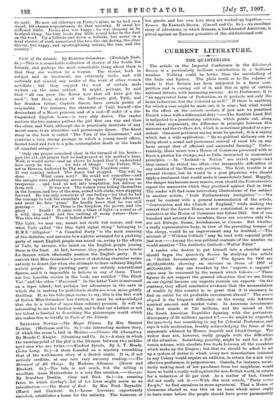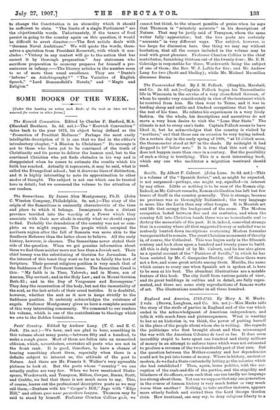A reader who desires to put himself into a cheerful
mood should begin the Quarterly Review by studying the article on "British Investments Abroad." The figures for 1906 are £3,220,000,000, showing an increase on those of 1897 of £670,000,000. Any one troubled by the "exports v. imports" scare may be reassured by the remark which follows :—" These figures do not support the general allegation that we are living on our capital because our imports exceeds our exports. On the contrary, they afford conclusive evidence that the accumulation of wealth by this country is so great that it is necessary to find an outlet for its profitable investment abroad." The amari atiquid is the frequent difference on the wrong side between nominal amount and market value. In American investments the first stands at 750 millions, and the second at 569, the South American Republics figuring with the portentous discrepancy of 39 millions against 6.7.--As might be expected, the Quarterly has something to say for Colonial Preference, and says it with moderation, frankly acknowledging the force of tho arguments adduced by Messrs. Asquith and Lloyd-George. The writer does not, however, really grapple with the difficulties of the situation. Something, possibly, might be said for a Zoll- verein scheme, with absolute free trade between all the countries which make up the Empire ; but that we should be asked to set up a system of duties to which every new manufacture initiated in any Colony would require an addition, in return for a not very effective preference, is preposterous. Canada, for instance, neces- sarily making most of her purchases from her neighbour, would have us build a costly wall against the non-British world, in return for a reduction of 35 per cent. As a matter of fact, Canada did not really ask it.—With the next article, "Party versus People," we find ourselves in more agreement. That a House of Commons elected as was this on an issue which never ought to have come before the people should have power permanently
to change the Constitution is an absurdity which it should be sufficient to state. "The limits of a single Parliament" are the objectionable words. Unfortunately, if the taxers of food persist in going to the country again on this question; it would be difficult to avert disaster.—The first article deals with "German Naval Ambitions." We will quote the words, them- selves a quotation from President Roosevelt, with which it con- cludes "Victory in any contest will go to the nation that has earned it by thorough preparation." Any statesman who sacrifices preparation to economy prepares for himself a pre- eminence in infamy.—The literary articles in the number seem to us of more than usual excellence. They are "Dante's 'Inferno' an Autobiography?" "The Varieties of English Speech," "Lord Beaconsfield's Novels," and "Magic and Religion."







































 Previous page
Previous page